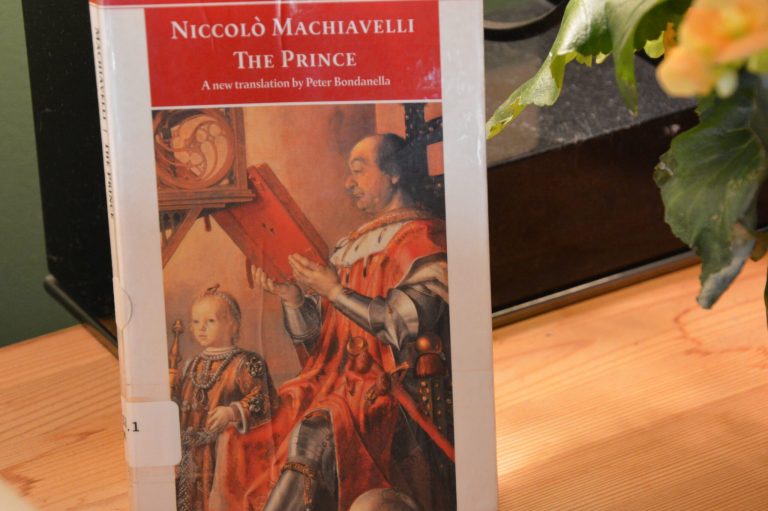
The runup to the 2024 presidential election is upon us and it’s by no means clear whether Biden or Trump will triumph. The debates will be of interest, the polls will be watched and in November we the people will decide who will run the country for the next four years.
I have met many politicians over the course of my life, including Donald Trump, and they all have talent, social skills, and a group of trusted advisers who provide feedback and support. It may be that many of these politicians have not read Niccolo Machiavelli’s “The Prince,” but there is not doubt that their speech writers and chief of staffs have. Here’s why.
In the 16th century Niccolo Machiavelli was the chief adviser to the Medici family and other monarchs who ran the principalities of Italy. His treatise about statecraft was written in 1532 and it is still considered to be a masterpiece of rhetoric, the foundation of modern politics and a major philosophical work on the nature of power.
I will outline six of the major tenets of his book:
1) The character of a leader: A king, a prince, a leader or a president needs to have three elements, including a moral gentle sense coupled with the cunning of a fox and the ferocity of a lion. When Machiavelli discusses this, he refers back to the ascension of Achilles, who was said to be raised by Chiron, the centaur who was half man and half horse. Machiavelli uses this as a metaphor to suggest that a leader needs to be open to both his human side and his beastly side. The use of this Greek myth is reminiscent of Remus and Romulus, the founders of Rome, who were said to be suckled by a she-wolf. What this means for any modernday politician is that you had better be human but use some of our more base instincts, including deceit and aggression.
2) The power of persuasion: Machiavelli instructed Medici and other monarchs on the art of rhetoric or the ability to excite, exhort and rouse the crowds. He taught them how to use catchy slogans, metaphors and the use of beautiful and vivid words to make clear what he wanted to say. In modern times, John F. Kennedy was a master of rhetoric (“Ask not what your country can do for you but what you can do for your country”) as was Ronald Reagan (“Make America great again!”) Speech making is an essential ingredient to win any election.
3) Virtue vs. luck: Machiavelli talks at length about the cultivation of virtue and the importance of fortune or luck. He is not defining virtue in a moral sense but rather as having talent or ability, which he encourages the prince to develop. Machiavelli also suggests that luck or fortune is a huge factor in success accounting for nearly half of all victories. There is an ancient credo in Korea that success derives from three things: luck, hard work and genius and of these three, luck is the most crucial.
4) The relative nature of honesty: Machiavelli writes “honesty is a priority over self-interest unless security is at stake.” This statement is often why Machiavelli is criticized for embracing the philosophy that the means justifies the ends. However, many years ago I learned why dishonesty and deception are so crucial. Since I was about 14 years old my father had a close friend who I would often see on weekends and play golf with at the club. He was good looking, charming, well-dressed, and kind and I was told his occupation was a travel agent. I grew up believing this. About 10 years ago I lost track of him and I asked a mutual friend who was in politics about where my old friend was. My political friend said to me “Hey, Tom, don’t you realize who he is? He’s a CIA operative and he’s overseas at the moment.” Deception is a necessary part of statecraft and power.
5) Live among your subjects: In 16th CCCCentury Italy, there was much shifting of power among European nations and within the principalities of Italy. Machiavelli advised his monarchs to move to the principality that had just been captured. He realized that the ruler needs good luck and diligence to hold on to a land that has just been captured. In order to remain in power in the new land one has to move there so that when trouble is spotted, it can be quickly remedied. To ignore minor problems means that they will grow and lead to ruin. This is a simple tenet I have frequently observed with some of my patients who own businesses. With success comes money and the temptation to take your foot off the pedal, relax and ignore the business. To do this is to invite problems and even failure.
6) How to handle a land filled with insolence, quarrels and thievery.: Machiavelli believed that it was sometimes necessary to take cruel and unusual measures in order to restore order and peace. He hired Remirro de Orco, a barbaric and unscrupulous police chief to a recently acquired principality that was corrupt and leaderless. Remirro de Orco quickly restored order and peace. This story is eerily similar to the way Mayor Rudy Giuliani cleaned up New York City when it was filled with graffiti, turnstile jumpers and squeegeemen. He hired Police Chief Bill Bratton, who quickly established a zero tolerance policy on these minor crimes, and within a year made New York City livable again.
So there you have it. If you want to learn more about how our political system works, you could not do better than to read “The Prince” by Niccolo Machiavelli. It was written in the 16th century, but his practical, realistic advice on how to win an election and hold power still applies. And the politician who follows Machiavelli’s treatise will have an edge.







